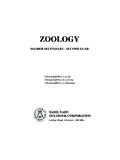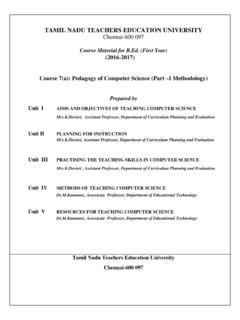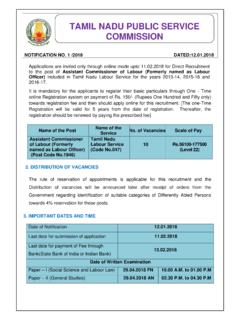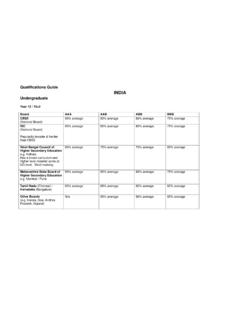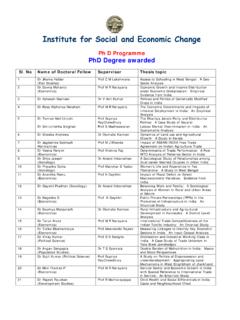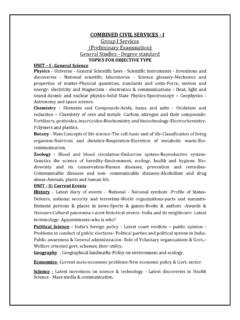Transcription of Economic ThEory - Government of Tamil Nadu, India
1 Economic ThEory HIGHER SECONDARY-SECOND YEAR. A Publication under Government of Tamilnadu Distribution of Free Textbook Programme (NOT FOR SALE). Untouchability is a sin Untouchability is a crime Untouchability is inhuman TAMILNADU TEXTBOOK AND. EDUCATIONAL SERVICES CORPORATION. College Road, Chennai- 600 006. Government of Tamilnadu First Edition - 2007. Revised Edition - 2016. Reprint - 2017. Price : Rs. This book has been prepared by the Directorate of School Education on behalf of the Government of Tamilnadu This book has been Printed on 60 GSM Paper Printed by Offset at: ii CONTENTS. Page No 1 Nature and Scope of Economics 1.
2 2 Basic Economic Problems 24. 3 ThEory of Consumer Behaviour 35. 4 Demand and Supply 58. 5 Equilibrium Price 78. 6 Production 88. 7 Cost and Revenue 107. 8 Market Structure and Pricing 120. 9 Marginal Productivity ThEory of Distribution 137. 10 Simple ThEory of lncome Determination 154. 11 Monetary Policy 172. 12 Fiscal Policy 186. iii iv Chapter 1. Nature and Scope of Economics Introduction Economics is a social science which deals with human wants and their satisfaction. It is mainly concerned with the way in which a society chooses to employ its scarce resources which have alternative uses, for the production of goods for present and future consumption.
3 Political economy is another name for economics. Polis in Greek means a State. The early writers used the term Political Economy for the management of the State. A person who runs a family is expected to make the best use of the income of the household. Similarly, the State is expected to get the maximum benefit for the society. Hence the term Political Economy . The existence of human wants is the starting point of all Economic activity in the world. Unless we make efforts, we cannot satisfy wants. Hence, wants, efforts and satisfaction form the circle of economics. We may say economics is the science of wants.
4 But in the real world, the means which satisfy our wants are limited, that is, there is scarcity of the means which satisfy our wants. Time and money are limited. And land, labour and capital which are used in production are limited. Though science has increased our resources, our wants have also increased. We may satisfy some wants now. But soon, new wants appear. But all our wants cannot be satisfied because means are limited. We study economics because there is scarcity of many goods we want. This problem is common to the individual as well as the State. That is why we say Economics is the science of scarcity.
5 And scarcity is the basic fact of life. Our wants are unlimited but means are limited. This leads to choicemaking. If there is unlimited supply of goods which satisfy our wants, the problem of choice will not arise. It is true that we have many wants. But all wants are not of equal importance. So we choose the more important and the more urgent wants. So choice is the essence of Economic activity. We may also say that economics is the science of choice. Of course, all goods we want are not scarce. There are certain things like air and sunshine which are available in abundance. Though they are very essential for our life, we do not pay any price for them.
6 They are free goods and they are not very important for our study. But many things we want are scarce and we have to pay a price for them. So, in economics, we study how prices of different things are determined. We may also say that economics is a science that deals with pricing process. Modern economy is a monetary economy. Prices are paid in money. So money plays an important role in the Economic life of a society. It is used for buying 1. and selling of goods, for payment of rent, wages, interest and so on. In economics, we study about the role of money in the affairs of mankind. We shall now sum up our discussion about the nature of economics.
7 Economics is a social science which studies about human wants and their satisfaction. Human wants are unlimited. So scarcity is the fundamental fact of life. As all wants are not of equal importance, this leads to choice. Economics is the science of choice. As there is scarcity of goods, we have to pay a price for them. So, economics studies about the pricing process. And, as prices are paid in money, we study about the part played by money in the Economic life of a society. We study how people get and spend money, how they earn a living and how it affects their way of life and so on. All the scarce goods which satisfy our wants are known as wealth.
8 So, in economics, we study about the production of wealth, exchange of wealth, distribution of wealth and consumption of wealth. As wealth is produced to promote human welfare, we study the relationship between wealth and welfare. Definitions of Economics We can have a good idea about the nature and scope of economics by studying some of the important definitions of economics. Some of the important definitions of economics are those of leading economists like Adam Smith, Alfred Marshall, Lionel Robbins and Samuelson. Adam Smith's Definition (Wealth Definition). Adam Smith (1723-90) defined economics as follows : Economics is the science of wealth.
9 He is the author of the famous book Wealth of Nations (1776). He is known as the Father of Political Economy because he was the first person who put all the Economic ideas in a systematic way. It is only after Adam Smith, we study economics as a systematic science. The term wealth has a special meaning in Economics. In the ordinary language, by wealth , we mean money, but in economics, wealth refers to those goods which satisfy human wants. But we should remember all goods which satisfy human wants are not wealth. For example, air and sunlight are essential for us. We cannot live without them. But they are not regarded as wealth because they are available in abundance and unlimited in supply.
10 We consider only those goods which are relatively scarce and have money value as wealth. We study about consumption, production, exchange and distribution of wealth. Mill defined economics as the practical science of the production and distribution of wealth . Adam smith was of the view that economics was concerned with the problems arising from wealth-getting and wealth-using activities of people. He was interested mainly in studying the ways by which the wealth of all nations could be increased. 2. Criticism There is a lot of criticism against Adam Smith's definition of economics. It has got a bad name for economics.

